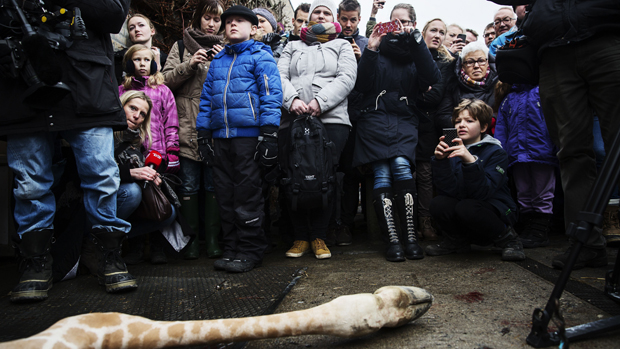Did Copenhagen Zoo have to kill Marius the giraffe?
A two-year-old giraffe at the zoo was killed over the weekend after on online petition to save his life was rejected

A free daily email with the biggest news stories of the day – and the best features from TheWeek.com
You are now subscribed
Your newsletter sign-up was successful
ZOOKEEPERS at Copenhagen Zoo ignored an online petition that gathered over 27,000 signatures over the weekend in a bid to prevent the death of Marius the giraffe.
In spite of receiving death threats, the zoo's scientific advisor Bengt Holst was unrepentant about his decision to euthanise Marius. Copenhagen Zoo is part of a breeding programme, and its bylaws explicitly prohibit inbreeding in order to maintain the overall health of the herd, and, Holst noted, Marius's genes were already overrepresented in the stock.
"Giraffes today breed very well, and when they do you have to choose and make sure the ones you keep are the ones with the best genes," Holst told the BBC. The two-year-old giraffe was killed publicly with a bolt gun, and the body was fed to the zoo's lions.
The Week
Escape your echo chamber. Get the facts behind the news, plus analysis from multiple perspectives.

Sign up for The Week's Free Newsletters
From our morning news briefing to a weekly Good News Newsletter, get the best of The Week delivered directly to your inbox.
From our morning news briefing to a weekly Good News Newsletter, get the best of The Week delivered directly to your inbox.
But did Marius need to die? A number of alternatives to euthanasia were presented to the zoo:
Other zoos offered Marius a home
Just before the weekend, several zoos volunteered to take Marius. Representatives from Yorkshire Wildlife Park near Doncaster offered to re-home the giraffe: "YWP has a state-of-the-art giraffe house built in 2012 with a bachelor herd of four male giraffes and the capacity to take an extra male, subject to the agreement of the European stud book keeper," a statement from Yorkshire Wildlife Park said. "One of the YWP giraffes is Palle, who came from Copenhagen zoo in September 2012, when he was the same age as Marius."
The offer was rejected because the Copenhagen zoo said the park was already well-represented with giraffes from Marius's genetic line.
A free daily email with the biggest news stories of the day – and the best features from TheWeek.com
Another offer from a zoo in Sweden was similarly discounted because the zoo in question could not promise it would not sell Marius on, Time magazine reports.
Marius could have been sent to a game reserve in Africa
Could Marius have been sent to the savannas of Africa to resume a life in the wild? Copenhagen zoo said this was not an option as animals that have been in contact with humans tend to be rejected by wild herds, and become easy prey for predators.
Marius could have been sold
Various papers report that a "private individual" offered to buy Marius for €50,000 (£41,000), but received no response. The zoo issued a statement to say that without further details it would be inappropriate for them to comment.
Marius could have been chemically castrated to prevent inbreeding
Some signatories to the petition argued that the giraffe could have been chemically castrated to avoid continuation of an undesirable genetic line. Holst countered that such measures could not have been taken because they tend to cause unwanted side-effects such as renal failure. Neutering the young giraffe, Holst said, "would have diminished his quality of life."
-
 How the FCC’s ‘equal time’ rule works
How the FCC’s ‘equal time’ rule worksIn the Spotlight The law is at the heart of the Colbert-CBS conflict
-
 What is the endgame in the DHS shutdown?
What is the endgame in the DHS shutdown?Today’s Big Question Democrats want to rein in ICE’s immigration crackdown
-
 ‘Poor time management isn’t just an inconvenience’
‘Poor time management isn’t just an inconvenience’Instant Opinion Opinion, comment and editorials of the day
-
 Epstein files topple law CEO, roil UK government
Epstein files topple law CEO, roil UK governmentSpeed Read Peter Mandelson, Britain’s former ambassador to the US, is caught up in the scandal
-
 Iran and US prepare to meet after skirmishes
Iran and US prepare to meet after skirmishesSpeed Read The incident comes amid heightened tensions in the Middle East
-
 Israel retrieves final hostage’s body from Gaza
Israel retrieves final hostage’s body from GazaSpeed Read The 24-year-old police officer was killed during the initial Hamas attack
-
 China’s Xi targets top general in growing purge
China’s Xi targets top general in growing purgeSpeed Read Zhang Youxia is being investigated over ‘grave violations’ of the law
-
 Panama and Canada are negotiating over a crucial copper mine
Panama and Canada are negotiating over a crucial copper mineIn the Spotlight Panama is set to make a final decision on the mine this summer
-
 Why Greenland’s natural resources are nearly impossible to mine
Why Greenland’s natural resources are nearly impossible to mineThe Explainer The country’s natural landscape makes the task extremely difficult
-
 Iran cuts internet as protests escalate
Iran cuts internet as protests escalateSpeed Reada Government buildings across the country have been set on fire
-
 US nabs ‘shadow’ tanker claimed by Russia
US nabs ‘shadow’ tanker claimed by RussiaSpeed Read The ship was one of two vessels seized by the US military